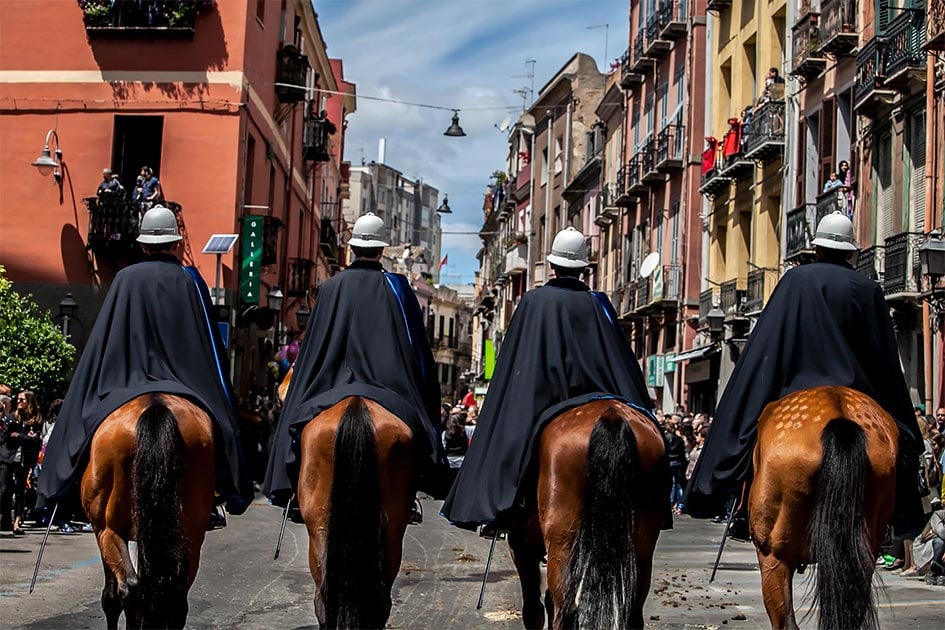Ancient Equestrian Tactics Used Against New Foe
Police forces around the world are deploying horses to maintain social control as communities begin to crack under the pressure of social restrictions.
Archaeologists know horses were ridden in Eurasian warfare between 4,000 and 3,000 BC, and Sumerian illustrations dating to 2,500 BC depict horses pulling wagons for soldiers. Just today Ancient Origins published a new article about the discovery of a 2 nd century Parthian warrior who had fought amidst fleets of skilled mounted bowmen using horses as mobile platforms from which to deliver their kill shots.
In the early 18 th century the French “Maréchaussée,” who became the gendarmerie, was the world’s first completely mounted national police force who patrolled extensively in rural areas with no roads, a situation that made horse-mounted policing a necessity in European states until the road building projects of the early 20 th century. But now, in the face of a new, less obvious enemy, horse patrols are being brought back all over the world to help police forces support social restriction orders.

French Maréchaussée, equestrian patrol. (Andynomite / Public Domain)
Australia Prefers Four Legs Over Two
Modern policing requires modern technologies, but sometimes more ancient methods are deployed, and in regards to the new patrols of mounted police in Australia’s public spaces Senior Sergeant Glen Potter, the head of Western Australia's Mounted Police section, told ABC News, “If you've got one horse, it's like having 10 coppers on the ground”. Police horses provide stability and force in turbulent situations, said Mr. Potter, especially when officers are struggling to keep order at “mass protests, riots, and large-scale events,” and they are also deployed in Australia’s remote areas in search and rescue operations.
As Australia releases its grip on social lockdown and its nightlife slowly returns people are starting to feel comfortable congregating in groups. In light of this police horses will become “much more visible to the average punter,” said PC Potter. This week, Western Australia’s highly-trained team of 20 police horses and mounted officers hit the streets after weeks of downtime due to the coronavirus pandemic and Senior Sergeant Potter said, “As tough as it's been for everyone, it has been a silver lining for the horses, as they can now be retrained”.

Australian mounted police. (Jenny Scott / CC BY-NC 2.0)
Unprecedented Crowds In The UK Need Proper Horsing
In the UK the head of South Wales Police, Chief Constable Matt Jukes, says horse mounted officers will be patrolling “parks, beaches, and forestry” to ensure people are not breaching COVID-19 restrictions. While the chief constable is confident most people are following guidelines and staying at home, despite warnings over social distancing, according to a BBC report last weekend saw “unprecedented crowds” gathering at tourist destinations such as Barry Island Pleasure Park and Porthcawl on the south coast of Wales in the county borough of Bridgend, 25 miles (40 kilometers) west of the capital city, Cardiff.
- Cataphracts: Armored Warriors and their Horses of War
- Lockdown is the New Norm, But All is Not Lost As Virtual Museums Open
- Scythian Tactics and Strategy: Scorched Earth Victories - Part II

Ancient equestrian enforcement / crowd control. (Jordiferrer / CC BY-SA 4.0)
Dukes said the police “don't want people gathering on the beach fronts and in the forestry in our area” and he urges the public that if they’re looking for a way to “creep in between these rules, you are missing the point” reminding people that COVID-19 is a national emergency and people “do need to act in ways which are responsible”.
What About Horse Patrols In The Middle East?
The Dubai Mounted Police Unit, who you can watch parading on YouTube, are also keeping communities safe during the coronavirus pandemic by carrying out nightly patrols to ensure members of the public are adhering to stay-home orders put in place to combat the virus. In a recent article in The National horse mounted police in Dubai are being forced to patrol to “catch those out flouting crucial orders”.
According to Arab Horse the history of the Arabian horse is “thousands of years old, filled with poetry, art, and romantic legends” from the days of gallant desert warriors to the age of information, the superior qualities of the Arabian horse have been carefully preserved “as the world ’s oldest equine breed”. The artists of ancient Egypt painted this animal’s distinctive silhouette more than 3,500 years ago, but it was the nomadic Bedouin people of the Arabian desert who created and refined the pure breed that exists today.

Ancient Arabian horses / equestrian troops. (Floti8 / Public Domain)
Established in 1976 with seven horses, five riders, and four horse groomers, today, the Dubai Mounted Police department boasts more than 130 Arabian and Anglo-Arabian horses, 75 riders, and 45 groomers. Police Captain Al Jallaf told The National, “horses are used for securing areas that are not easily reachable by patrol cars such as narrow lanes and beaches,” and he added that it ’s priority is to ensure the safety of not only Dubai ’s residents “but also of our horses and police officers”. The horses are loaded on to trucks and transported to the assigned locations and the police captain said, “if we find anyone, other than essential workers, on the streets without a movement permit, we check their Emirates IDs, and depending on the situation we either give them a warning or issue a fine”.
And What’s Happening In China, Where The New Enemy Originated?
A Business Insider article highlights how the novel coronavirus has spread to almost every corner of the world infecting more than 3.5 million people in 150 countries and causing 248,000 deaths (at time of writing), and while this new coronavirus was first identified in the Chinese city of Wuhan, it has now affected almost every province and region of China.
Much of modern China is like medieval Europe, and in this instance I don’t mean the fact they eat 10 million dogs a year, or hold Christians and Muslims in prison camps, but there are virtually no roads in a large part of the country. This means Chinese police have had to ride on horseback for hundreds of miles through extremely snowy conditions to reach nomad communities in the northwestern Xinjiang region, one of the most remote areas in the world, to inform them about the dangers of the virus. One single infection in these hospital free communities could signal Armageddon for thousands of indigenous nomads.
Top image: Ancient equestrian tactics are being used to enforce the coronavirus lockdown. Source: mrfk / Adobe Stock.
By Ashley Cowie




















Comments
I find it shameful that this website is celebrating the return of policing from horseback as it was done like in the Middle Age by feudal lords. any idiot that really tries to police the crowd from horseback against a determined populace is going to end up flying through the air and landing on the pavement hard.
We will not be suppressed.